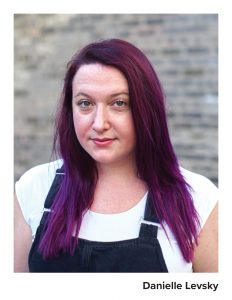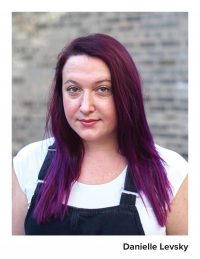The Roots of Tikkun Olam in Jewish Theatre
This week’s post is by Danielle Levsky, the Social Media Manager for the Alliance of Jewish Theatre Festival and a post-Soviet Jewish clown.
The Alliance for Jewish Theatre has successfully advocated for Community/Kehilla by connecting 
We also host annual conferences around the world for our networks and members to connect, where we find much important discourse, joy, and celebration, as well. We come together for our annual conferences to discuss trends in Jewish theatre making, in American theatre, in international and local politics and what is currently affecting our artistry.
This past year, in the 2019 Alliance for Jewish Theatre Conference, I co-organized a panel on making theatre about the Israel-Palestine conflict. Some questions that the panel discussesd were: What are we, as theatre people, doing to present work portraying the Israel-Palestine conflict? How does context play a role in what we do? How is the conflict affecting us in the theatre world, in the Jewish world, and personally?
It was not perfect. Despite our best attempts, in the end we were not able to secure a Palestinian on the panel. Several of our panelists have spent time in Israel/Palestine and have worked with Palestinian artists and they did their best to share those experiences with the audience. We hope that in the coming years, we will have one or more Palestinians on our panel to give us the widest range of views on issues.
The Alliance is also very conscious of the theme of kedusha, finding transcendent meaning in the art of theater making. We are the sole organization in the United States that represents Jewish actors, directors, theatre companies, and designers. The largest criteria for becoming a member of our organization is showing passion and devotion to Jewish theatre-making.
My time working with and attending the 2019 Alliance for Jewish Theatre’s conference was a profoundly affirming experience of my Jewish identity and my love for theatre making. Humans, on the whole, are both beautiful and greatly flawed. Theatre and live performance is specifically about displaying this duality. No narrative is better at doing this than the stories of the Torah—human stories of trials and triumph.
I want to return to the theme of tikkun olam. Many Jews in the United States have been fortunate to have few, if any, barriers to their practice of and belief in Judaism. To live as a Jew in North America, it is easy to forget that we, as a people, have overcome incredible adversity in order to survive.
My family came to the United States in 1992 from the Soviet Union as political refugees. During their immigration interview, the American embassy in Moscow asked, in broken Russian, why they wanted to leave the Soviet Union. They said they were leaving because of discrimination against Jewish people. My parents recalled how their youth was full of microaggressions, offensive commentary, and name-calling. They recalled how they were rejected from universities once admissions offices saw the ethnic section on their passport that identified them as Jews. They recalled how they were not considered for employment, how they had to network with friends and family just to secure an interview. My mother described how one HR department first asked her how they knew they could trust her, and how they knew she wouldn’t leave the Soviet Union at the drop of a hat.
Though riots and hate speech were illegal under Soviet rule, the air was thick with hatred for those who were not inherently Russian: Jews, religious Christians, Roma, Muslims, Kazakhs, and more.
The United States brought a lot of promise and hope for my family, but they never forgot the hate that they experienced in Russia. They encouraged me to find the good in others, but always to be wary of revealing too much about my background (specifically, the Jewish part) because of how people might treat me after learning about it.
In August 2017, white supremacists, Neo-Nazis, and the KKK descended upon Charlottesville, Virginia for the Unite the Right Rally. They carried torches, held Confederate flags, and wore swastikas while chanting “White Lives Matter,” “Jews will not replace us,” and more. Anti-racist counter-protesters were brutally beaten. White supremacist James Alex Fields Jr. intentionally drove his car into a crowd of anti-racist counter-protesters, killing Heather Heyer, 32, and injuring 19 others. President Donald Trump waited 48 hours before finally condemning white supremacists — only to backtrack and defend white supremacists during a later press conference. Americans responded to these events with disbelief and sheer horror. They couldn’t believe this would happen in their country, and certainly not in 2017. I believed it. And I wasn’t surprised.
Connecting Jewish theatre artists and companies to one another allows us to come together in times of hardship, in times of peace, and always, in times of connection. Theatre must be a place that welcomes all – a place where we can mirror the human experience, showing how similar we all are when we peel away the trauma. May the seeds and trees that have been planted in the collective consciousness of this community inform our own work and extend out into the world.
[themify_hr color=”black” width=”100%”]
Danielle Levsky is the Social Media Manager for the Alliance of Jewish Theatre Festival and a post-Soviet Jewish clown. Her love of theatre-making and Jewish identity are inherently intertwined. Making art and making theatre is rooted in repairing the world and, therefore, rooted in political activism.


